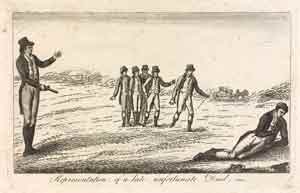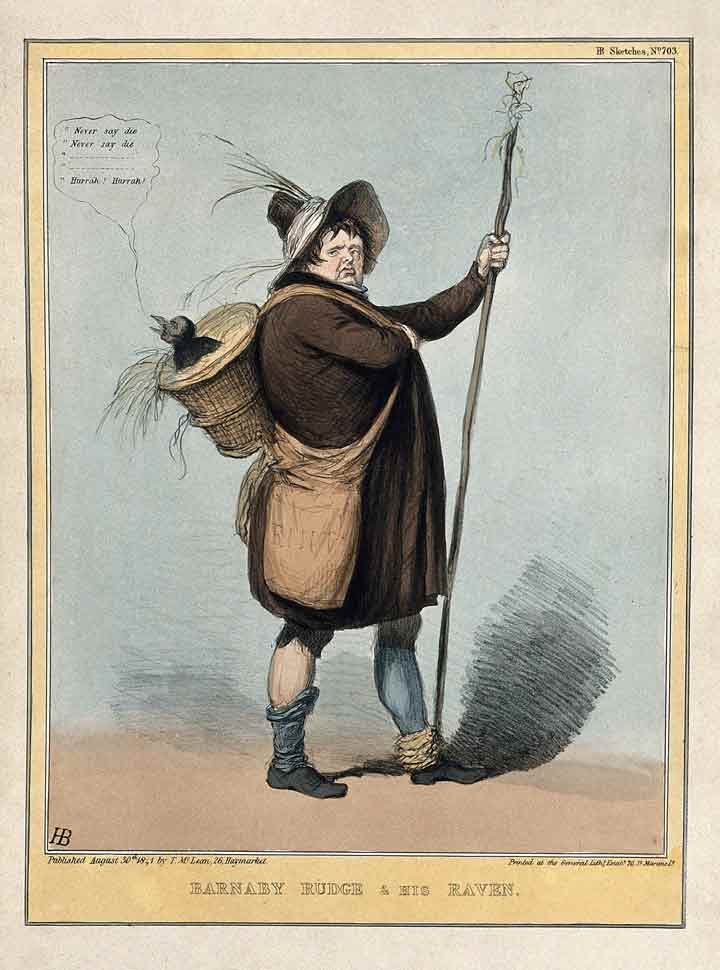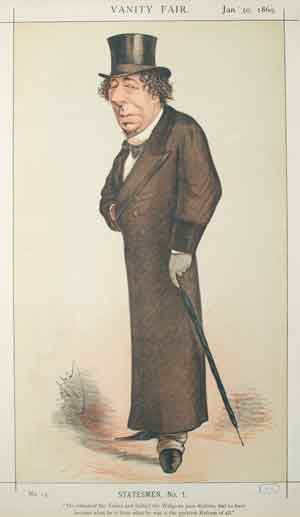THE DUEL BETWEEN ‘DANNY’ AND’ DIZZY’
Published in Features, Issue 4 (July/August 2022), Volume 30By John Rodden
A once-famous and now all-too-forgotten episode in the annals of ‘sensational spats’ was the belligerent confrontation between the 60-year-old Daniel O’Connell, then near the height of his reputation and influence, and the brash, ambitious, 31-year-old Benjamin Disraeli, future Conservative prime minister of the United Kingdom. It was a historic encounter—indeed, it resulted in a challenge to a duel and nearly led to that outcome—that reveals much about both men and bears retelling.
The year was 1835. In an open letter in The Times of London, addressed to Ireland’s senior MP, Daniel O’Connell (1775–1847), young Disraeli, campaigning for a seat in parliament as a Tory (unsuccessfully, as it turned out), attacked the Whigs for their alliance with O’Connell. Beholden to the fiery Irish hothead O’Connell and his fellow radical supporters who favoured greater independence from Westminster for this mere colony across the Irish Sea, the Whigs were disloyal subjects to the Crown, charged Disraeli.

Above: O’Connell had killed John Norcott D’Esterre in an affaire d’honneur in 1815 and had forsworn duelling ever since—a fact of which Disraeli would have been aware when he demanded ‘satisfaction’ of O’Connell twenty years later. (Irish Magazine, March 1815)
Already by this time one of England’s leading men of letters (the author of nine novels, several books of non-fiction and even a book of poetry), Disraeli (1804–81) took special pains to single out O’Connell in offensive terms, attacking him—according to newspaper reports—as ‘an incendiary and a traitor’ to the British Crown. (Disraeli had in fact accused O’Connell’s Whig supporters of betrayal, but the newspaper stories reported it as if Disraeli had branded O’Connell himself a ‘traitor’.)
Offended by this audacious upstart, O’Connell—the first Irish Catholic member in Westminster, the beloved ‘Liberator’ who had won so-called ‘Catholic Emancipation’ in 1829—responded with equal vituperation. He resented Disraeli’s criticism, judging it (accurately) to be a campaign ploy to win attention for himself, and proclaimed that Disraeli was no upstanding, loyal Englishman.
In a speech in Dublin O’Connell derided Disraeli as ‘a reptile’, typical of would-be Conservative MPs by his ‘perfidy, selfishness, depravity, and want of principle’. (It especially galled him and his Irish supporters that, in a previous—unsuccessful—election, Disraeli had sought his campaign endorsement.)
PERCEIVED ANTI-SEMITISM
Noting that Disraeli’s name ‘shows he is of Jewish origin’, O’Connell contended that he did not intend the observation to represent ‘a term of reproach’ but rather that Disraeli was a shame to the Jewish race.
This sharp retort by O’Connell shows how deeply Disraeli had stung him. For O’Connell was no anti-Semite—quite the reverse. He was sympathetic to the idea of a ‘Judaeo-Christian’ religious tradition and was a vocal advocate for Jewish emancipation.
In reply to O’Connell’s perceived anti-Semitic broadside, Disraeli vowed to ‘pursue O’Connell’s existence’ with ‘inextinguishable hatred’ and to publicise how O’Connell had exploited the Irish masses with empty promises and policies, accusing him (falsely) of financial gain ‘wrung from a starving race of fanatical slaves’.
Of lasting fame is Disraeli’s memorable defence of his Jewish ethnicity in the course of mocking O’Connell’s Irishness. Almost two centuries later, Disraeli’s words about his Jewish ancestry are quoted proudly by Jews as an early example—if not the very first instance—of a Jewish politician in Europe standing up publicly for his ethnicity in unequivocal and outspoken terms: ‘Yes, I am a Jew and when the ancestors of the right honourable gentleman were brutal savages on an unknown island, mine were priests in the temple of Solomon’.

Daniel O’Connell, in the character of Charles Dickens’s Barnaby Rudge, carries on his back a raven with the head of Lord Melbourne, Whig prime minister in 1835 when a young Benjamin Disraeli attacked the Whigs for their alliance with O’Connell. Coloured lithograph by ‘H.B.’ (John Doyle), 1841. (Wellcome Collection)
Completely lost in the contretemps was the fact that Disraeli was not a practising Jew. In fact, he had been a baptised Christian since the age of twelve. (This was well known to everyone. Jews, as such, still suffered from many of the same exclusionary laws that had applied to Catholics until 1829; for example, they were forbidden by law until 1858 to enter parliament. Disraeli himself eventually entered the House of Commons in 1837 as a Christian—and that was on his fifth attempt, attesting further to his burning ambition and iron will.)
OF INVECTIVE AND INSULT
No matter. The clash had now taken on a life of its own. O’Connell escalated the battle with a salvo on the floor of the House of Commons, deriding Disraeli in no-holds-barred terms. In remarks that have been received by generations of Jews since the 1830s as nothing less than the slander of a vicious anti-Semite, O’Connell declared:
‘His name shows that he is of Jewish origin. I do not use it as a term of reproach; there are many most respectable Jews. But there are, as in every other people, some of the lowest and most disgusting grade of moral turpitude; and of those I look upon Mr Disraeli as the worst. He has just the qualities of the impenitent thief on the Cross … I forgive Mr Disraeli now, and as the lineal descendant of the blasphemous robber, who ended his career beside the Founder of the Christian Faith, I leave the gentleman to the enjoyment of his infamous distinction and family honours.’

Above: Benjamin Disraeli as depicted by Vanity Fair in 1869. On the strength of his captivating personality and prodigious gifts, Disraeli ascended to the very pinnacle of power and prestige in British life.
Although it is hard for most hearers to accept today, the fact is that O’Connell was not, in fact, denouncing Disraeli as a Jew as such but as the descendant of ‘the bad thief’ hanging on the cross next to Jesus at Calvary—that is, a criminal. (Of course, to our ears in the post-Second World War era—in the aftermath of Hitler and the Holocaust—O’Connell’s language sounds inescapably anti-Semitic.)
So insult was traded for insult, and soon the allies and enemies of O’Connell and Disraeli began lining up for and against each man.
UNE AFFAIRE D’HONNEUR?
The exchange of insults was, however, just the beginning. Sensing an opportunity both to make a name for himself as a national figure and to exploit the animosity that many British leaders harboured towards Irish radical upstarts like the so-called Liberator, young Disraeli demanded ‘satisfaction’.
It was known that O’Connell was a skilled duellist and had killed John Norcott D’Esterre, a former royal marine, in an affaire d’honneur in 1815—and had forsworn duelling ever since that death. (In fact, Robert Peel, the future prime minister, had also challenged O’Connell to a duel, which never took place because O’Connell declined, and the pair resolved their immediate differences.) Consequently, Disraeli issued his challenge to Morgan O’Connell, Daniel’s son. Morgan, an inexperienced duellist, declined responsibility for his father’s intemperate remarks.
The duel between Disraeli and O’Connell would therefore remain confined to verbal fisticuffs. Disraeli shrewdly counted on that outcome. He was not skilled with pistols and would never have been a match for the senior O’Connell; moreover, he knew that it was likely that Morgan would refuse his challenge, and that he in turn would gain great honour in senior Conservative Party circles for his audacious challenge to the rebellious, traitorous Irish ‘Liberator’. He turned out to be correct in his calculations on all counts.
Disraeli also used the occasion to publish the elder O’Connell’s letter of reply to the duel challenge—in which he made reference to ‘the impenitent thief’—along with his own letter containing his famous defence of his Jewishness. By shifting the context of his own Jewishness from O’Connell’s focus (the bad thief who insults the dying Christ) to an elevated and cultured Judaism (the priests in the temple), Disraeli cleverly associated himself with an educated, noble British ruling aristocracy—both of which were far above the ‘savage’ Irish. Moreover, by throwing down the gauntlet he had projected an image of physical bravery. As his biographer Adam Kirsch comments, that self-advertisement weighed heavily in a society—especially in a political party—still beholden to ‘aristocratic codes of manliness’. Disraeli ‘was a Jew but he was not a coward’. Just the reverse: his defiant conduct had seemed to fulfil the special Latin motto that he had affixed in his twenties to the Disraeli family crest—Forti nihil difficile (‘Nothing is difficult for the brave’).
Here again it warrants emphasis that, despite his outburst about Disraeli’s Jewishness, O’Connell was no anti-Semite whatsoever. O’Connell was anti-Disraeli, not anti-Semitic. A champion of Jewish emancipation throughout Europe, he courageously spoke out against Pope Gregory XVI’s discriminatory treatment of Jews in the Papal States.
O’Connell’s radicalism was thoroughgoing and consistent: just as he advocated liberty and ‘liberation’ for the Irish and for Catholics, so too did he for the Jews—and, in fact, for ‘Negro slaves’ as well. (He was much admired by Frederick Douglass, the American abolitionist leader and an escaped slave, who attended an O’Connell rally in Dublin in September 1845 and was ‘completely captivated’.) O’Connell was a vociferous opponent of slavery in general and the slave trade in particular. By contrast, attempting to ingratiate himself with leaders in the Conservative Party and numerous British aristocrats, Disraeli was very definitely anti-Irish—both early in his career as a backbencher and later as Conservative Party leader and prime minister. The brilliant and engaging Disraeli was a firm believer in British imperialism and colonialism, an unapologetic defender of the Empire.
SPARRING WITH CLIO: THE VERDICT OF HISTORY
In hindsight, the fair-minded historian must conclude that ‘Dizzy’ (as his friends—and even many of his constituents—fondly called him) outmanoeuvred ‘Danny’ in these once-famous verbal fisticuffs between these two oratorical virtuosos, the aging Irishman and the young Jewish literary and political genius.
Within days after the issue of the duel had been resolved in 1835, Disraeli wrote in a letter to his first wife that ‘here is but one opinion among all parties, namely that I have squabashed him’. However boastful and smug the claim, historians have generally assented to it.
Nonetheless, O’Connell and his allies in parliament had their revenge two years later in December 1837, when Disraeli suffered the humbling experience of having his maiden speech shouted down by O’Connell’s supporters. Uncharacteristically, he was temporarily cowed and maintained a low profile for the remainder of his first parliamentary session. He and O’Connell tacitly agreed to declare a truce; he had no notable interactions with O’Connell thereafter and remained a Conservative backbencher for the next fifteen years. But his star ascended in 1852—five years after O’Connell’s death—when he gained national office as chancellor of the Exchequer, and then rose to become Conservative Party leader and two-time prime minister in the 1860s and ’70s. His battles with Gladstone and the Liberals—and his countless bons mots and continued outpouring of significant and distinguished writings (e.g. Coningsby (1844), Sybil, or the Two Nations (1845) and Lothair (1870))—dominated the salons of London and the political and cultural pages of newspapers in Victorian Britain for decades.
Perhaps Disraeli’s most stunning achievement as a political figure and man of letters, however, was to turn his outsider status into a topic of endless fascination, thereby transforming his life into a work of art. His dandyism and foppishness, reflected in his outrageous choice of dress for a British statesman (e.g. a blood-red shirt with silver studs as big as shillings, immense scarf festooned with pistols and daggers, red cap and slippers, and blue broad-striped jacket and trousers) invariably made him the cynosure of all eyes long before he occupied No. 10 Downing Street. As Adam Kirsch observes, Disraeli’s style of dress and behaviour ‘was a way of acknowledging, by exaggerating, the impossibility of his ability to blend into the crowd … As always, if he could not fit in, he was determined to stand out.’
On the strength of his captivating personality and prodigious gifts, Disraeli ascended to the very pinnacle of power and prestige in British life—and in the Conservative Party, no less (then scarcely a hospitable home for an English Jew). It warrants emphasis—153 years after he ascended to his first term as the UK’s prime minister in 1868, leading a party that had been out of power for 30 years—that Benjamin Disraeli was the sole Jewish politician who had ever risen to occupy a major Western nation’s leading office and to hold it for a significant period of time until Léon Blúm in France in 1936.
John Rodden is Senior Fellow, Program in British Studies, Harry Ransom Research Center, University of Texas at Austin.
Further reading
P. Geoghegan, King Dan: the rise of Daniel O’Connell, 1775–1829 (Dublin, 2008).
P. Geoghegan, Liberator: the life and death of Daniel O’Connell, 1830–1847 (Dublin, 2010).
A. Kirsch, Benjamin Disraeli. (New York, 2008).
















